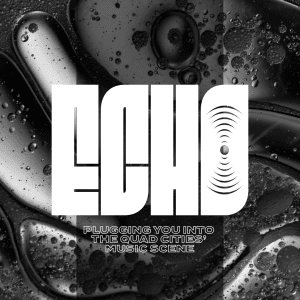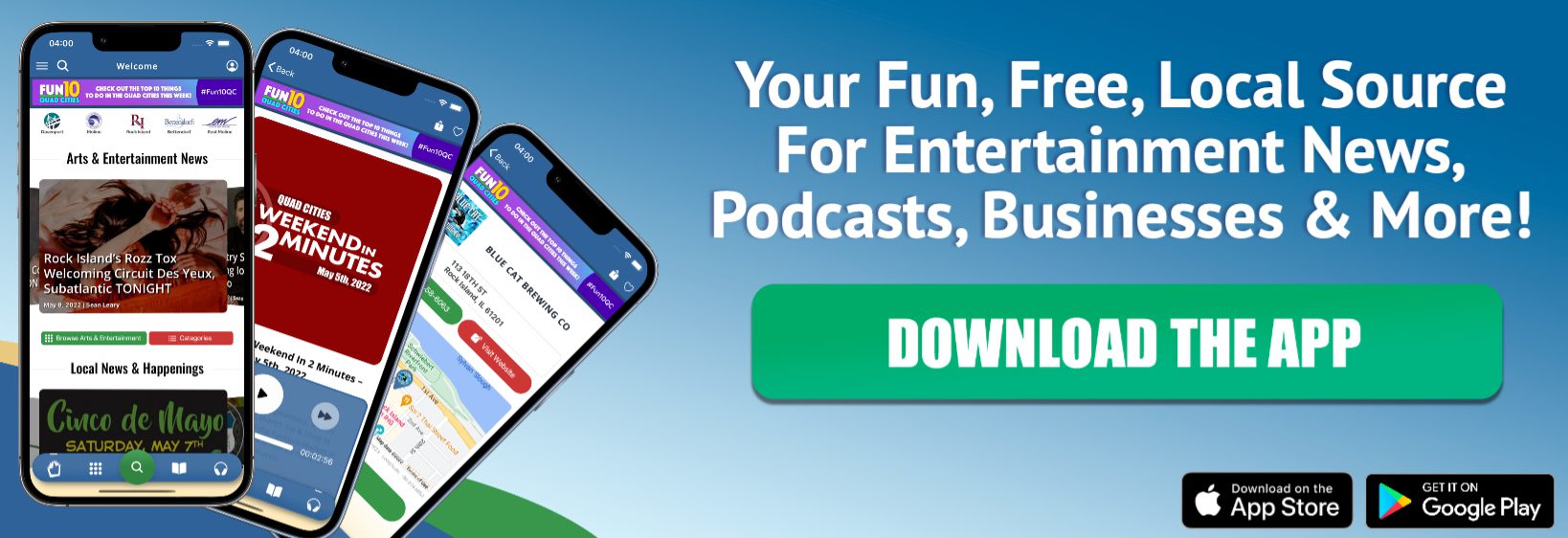A Guide To Quad-Cities Open Mic Nights, What You Need To Know
Saturday in the Arts is a weekly feature covering a trend, subject, event or personality of local interest. It runs every Saturday morning on your site for the best entertainment and arts coverage in the area, QuadCities.com!
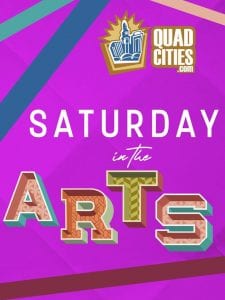 The following article is part of QuadCities.com’s partnership with local music website The Echo. For more, check out theechoqc.com!
The following article is part of QuadCities.com’s partnership with local music website The Echo. For more, check out theechoqc.com!
By
Open mics (OM) and jams (OJ) have been a long-standing tradition for generations in the music world and are a crucial grassroots method of building a healthy music scene. It is a ground-level entrance to any music scene for any experience level. They offer so many opportunities for both amateur and professional musicians. Not only to have fun and rock out in front of a crowd but to grow musically, professionally and become a part of the larger music community. Over the past 20 years, I have attended and hosted various OM and OJs in multiple cities and states. I have noticed that it can be confusing and daunting for the amateur or new to the OM/OJ scene musician. I have also found that some professional and more experienced musicians don’t see the value in performing for free at an open mic or jam. If either of these is you, you found the right article.
OM and OJ are a beautiful celebration of local live music and the community members that support it. They are a weekly, bi-weekly, or monthly event where musicians get together to perform and listen to a vast array of talent take the stage. It’s a place where the amateur and the professional can shred together and an opportunity for a first live performance, a seasoned artist sharing their gift, or a once in a lifetime super jam of your local favorites. OJ provides a place to network and find the musicians you need to start a band. There are screaming Blues jams, soul-quenching acoustic open mics, and wide-open format jams. As you can see, there is so much potential for a beautiful evening, but so much variation in format. Before we delve into the need to know essential OM and OJ etiquette, let’s take a quick look at how a musician benefits from these events.
There are personal benefits outside of the obvious reasons of having fun, being an active member of the greater music community, and living a fulfilled life. Let’s look at the two extremes of musicians’ experience levels: the amateur (also referred to as a beginner) and the professional (also referred to as an experienced musician). For the amateur musician, OM and OJs allow the opportunity to gain experience, exposure, and network with musicians, venues, and music appreciators. Over the past 17 years, I have hosted OJs and have witnessed so many nervous first-time jammers blossom into regular performers in the local music scene and beyond.
The professional or experienced player can also find opportunities to participate in the OM/ OJ scene. Yes, even if you are already in a group, solid solo or duo act, or are an experienced player who has done work in many formats and genres. I have always found that going to OM/ OJ is one of the easiest and quickest ways to find players, network, and become integrated into the local scene. Generally, OM/OJ are hosted and attended by working musicians who know quite a bit about the local scene. They know the venues, talent buyers, best gear repair shops and can help you connect with and collaborate with other musicians. Many OMs are typically hosted at music venues or establishments that are always looking for hot new or unknown talent to bring in. I have seen so many solo, duo and bands tear up OM/OJ a few times and receive gig opportunities and contacts. Have you ever heard the phrase “showing up is 90% of life?”
Many artists have been born out of or discovered by participating in OM/OJ sessions; two of my longest-running bands, The Uniphonics and Channel Cats, started by attending OJs. Did you know Blues Traveler played and scouted blues jams for players before making it? Beck and Regina Spektor were both “discovered” through playing OM/OJs in New York City. In the internet age, I constantly see posts that read, “guitarist looking for bassist and drummer” or “singer looking to start a rock band.” I often wonder if these people know another more direct way of scouting the local scene for players, by literally showing up, playing, and networking with the musicians who are as driven as they are to start a project.
As OM/OJ hosts, we should recognize our role and function to guide, encourage and love giving a platform for the next generation of musicians. Experienced musicians participating in OM/OJ should also help to train less experienced players. Nothing warms the heart like watching musicians shine and grow into themselves.
We know a few reasons why OM and OJ are fun and opportunities for friendships and have practical benefits. Because of the varied formats of OM and OJ, I have distilled the essential unspoken rules of the jam. Let’s delve into the “Jam Etiquette.”
#1 DO YOUR RESEARCH
To know what to expect and to get the most out of your experience, go onto the internet and do a quick search of the specific OM or OJ you may want to check out. If you have the time to go to all of the OM and OJs, do it. Because why not? These are the key factors to look for,

Craig Heidgerken
outside of the when, where, and what time.
Open Mic or Open Jam?
Open Mics (OM) are generally acoustic guitar-driven singer-songwriter events that welcome other stringed instruments, piano, hand drums, and sometimes drum kits; electric guitars are welcome. Most allow a wide range of genres, but they are geared towards specific themes, such as bluegrass, originals, or jazz. These events are attended by solo, duos, and small group artists. PAs are provided for use, but musicians should bring their own instruments. In certain circumstances and at some OM, some musicians may allow you to play their instrument. But remember, our instruments are like our little love babies, don’t expect to play with somebody’s love baby without knowing them.
Open Jams (OJ) are generally electric instrumentation-driven events that welcome all instruments. Open Jams can also range from a wide-open anything goes format to a specific genre jam; blues, jazz, 80’s rock. It’s okay to play a tune or two that are relative to the genre-specific jam, but remember that its genre-specific designation is what makes it unique. PAs, guitar and bass amps, and drum kits are provided for musicians to plug in and play, occasionally keyboards. Once again, refrain from asking if you can play someone’s guitar or use someone’s drumsticks. They are already providing the rest of the gear.
How to Sign up to Play
There are two main ways musicians “sign up” to play or sing at an OM and OJ; a signup list near the stage, or you have to talk to the bandleader. When an event does not include this info, expect the traditional method of talking to the bandleader or primary host. Occasionally there will be a call to sign up online ahead of time, especially for hip-hop and DJ open mic night.
Pro Tips: Generally speaking, musicians attending need to bring a guitar, bass, drum sticks, or keyboard. If possible, refrain from bringing pedal boards or your whole rig to an event. Quick setups and tear-downs between groups are crucial to the flow of OM and OJs. Don’t forget it’s all in the fingers anyway. If you don’t believe me, YouTube your favorite musician playing a toy instrument.
*EGO CHECK – In most traditional OM and OJ settings, it can take a few appearances at an event to get the opportunity to play on stage. Be humble. Host bands have the challenging task of keeping the audience entertained while providing space for a variation of musician experience levels and levels of sobriety.
#2 PREPARE
There are three basic guidelines to playing music with others. Show up on time, be easy to work with, and as Scar said, “be prepared.” These guidelines are also accurate for OM and OJs. The first two are pretty simple to understand. But what does it mean to be ready for an OM or OJ?
TUNE your instrument!!!: TUNE before you’re on stage if possible and double-check while you’re on stage. Once again, TUNE your instrument. You don’t want to waste your time or have all those awkward stares while you waste other people’s time tuning. Did I say TUNE your instrument yet?
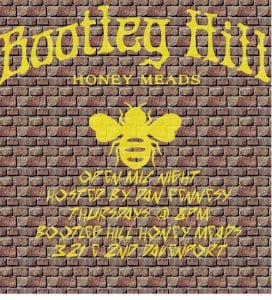
Bootleg Hill hosts an open mic night every Thursday.
Songs: You’ll get 1-3 pieces to perform based on how many musicians signed up and experience level. It’s always wise to go into the event with a grab bag of tunes you have ready to go. But also be prepared to play songs that the host band or other musicians may want to play. Quickly picking up pieces is a skill that needs fostering and is crucial for sitting in with people at an OM/OJ. It does take some ear training and some basic music theory knowledge. But trust me, it’s worth the practice, and the OM/OJ scene can help you put your practice into performance. That still holds if you’re playing solo, singing with the house band, or playing with your crew. The available slots can fill up fast, and it’s only common courtesy not to waste others time figuring out what songs to play while on stage.
Be ready to get on stage – Be in TUNE, but also be in tune with when you’re next on the list. Think about what songs you will play and assemble your group before you get called on stage. Hosts should not have to track you down when it is your time to shine.
Pro tips: Guitarists and Bassists, put the cable in an easy-to-find spot like a mic stand or on a guitar amp. If you’re an acoustic artist, make sure you ask if it’s okay to unplug your guitar. Never drop the mic!
*EGO CHECK – Be humble if you get put on stage with unfamiliar or less experienced musicians. We are always more and less experienced than the next musician. We are all where we are at that moment. Also, realize that sometimes hosts will put more experienced players with less experience to keep the ship afloat. Don’t worry. The crowd will know who is struggling. The crowd will also remember a bad attitude and a mature and talented musician who creates the best possible outcome.
#3 PERFORMING
So we are now on stage, our instrument is in TUNE, and we have picked some songs to play. Whether you’re playing solo, duo, or with a band, remember that OM and OJs tailor towards the musicians’ experience and the audience’s experience.
Surrender to the song: When playing your music or someone else’s, surrendering to the song is of utmost importance. We all have our style and flair, but playing what a piece need is the best way to make a song come alive. If a drummer isn’t playing a blues shuffle and the rest of the band is, it’s going to sound like a train wreck. (This applies to guitarists and other soloists that feel the need to solo over a vocalist, other players, or over the whole song.) Remember, you’re just one part of the whole. Anyone that has frequented OM/OJ has experienced uncomfortable situations and genres. That’s part of the exciting ride and explorative environment of OM and OJ. Just do your best, have fun, and surrender to what the song needs.
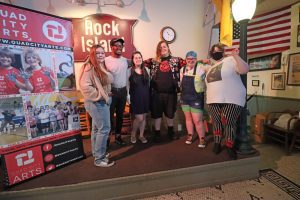
Metro Arts apprentices took part in an open-mic showcase at Theo’s in Rock Island.
Communication: One of the ways one can tell the maturity of a musician is by their ability to listen and keep in contact with the band while playing, by listening and eye contact. Remember, a team functions best when they work together. If you’re playing with others, be a part of the group.
Soloing: Instrumentalists, it’s your time to shine. It’s finally time to let loose and flex all those licks and tricks you’ve been woodshedding at home. While you’re up there melting faces, don’t forget that surrendering to the song is of utmost importance. If someone is playing a ballad or beautiful country song, it may not be time to show off your lightning-fast licks of doom. Remember soloing isn’t a marathon. Keep it short and focused.
Volume: If you’re playing acoustic guitar, please make sure your volume on your guitar is turned up, but not all the way. This will help the person working sound and make their job much more manageable. Most host guitarists and bassists will have a baseline volume level ready to go. They play at the same place every week and should have a good sense of an appropriate volume for the venue. Start with their settings. Musicians should always keep in mind the overall mix. That’s what the audience hears. We all know Jimi Hendrix turned it up. That was 60 years ago, technology has come a long way, and you’re not Jimi Hendrix.
Tone Knobs: Most guitarist and bass players are okay with changing their tone knobs on non-digital amps. But please always ask. Keyboardists try and work with their settings as much as possible also. They spent time sculpting their tones. Please ask first.
Drummers: Different drummers have different levels of dynamic control. Mature and experienced drummers have dynamic control and can get a good sound out of their drums at any volume. Dynamic control is a fundamental skill that needs to be fostered during personal practice. Hosts can get a guitarist or bassist to turn down, but we can’t “turn down” a drummer’s lack of dynamic control. Once everyone starts turning up, everyone and the music starts to suffer.
When to Stop: Most OM and OJs hosts will give musicians 1-3 songs, roughly 10-15 minutes, to perform. Hosts base this on how many musicians need to get up, their experience, and their level of intoxication. Even if a host tells you how many songs or how long to play, try and keep an eye out for the host after every song. They usually signal to you that you have one more song and sometimes to play an extra song.
Finished: Give thanks to the audience, host band, and exit as quickly as possible. The next act is just as excited as you were to get on stage and shred. Before unplugging instruments, please make sure the signal is muted or put it on standby. Either hand the cable to the next person or hang it on a mic stand or the amp it’s plugged into.
Pro Tips: If you’re new to playing in these environments, feel free to ask the host bands for some appropriate songs to learn in person or via message. There are also lots of “must-know” lists for genre-specific OM and OJs on the internet. Don’t feel like you need to pick and lead every song. It can be just as fulfilling, sometimes more, to tackle songs you have never played or didn’t choose.
*EGO CHECK: Don’t take it personally if someone asks you to turn down or play quieter. It may be the best way to make the group sound better together and protect the most precious gift of hearing. We all lose ourselves in the music and may have different standards for what is too loud for us, especially if we already have hearing loss. But don’t forget that surrendering to the song makes it sound the best. Also that all live music is a 50-50 relationship between musician and audience.
#4 DO NOT LEAVE IMMEDIATELY
You just walked off the stage, glowing from the experience you’ve just had. Good or bad, it happened, and you should be proud of yourself for getting on the stage. Get yourself a glass of water or another drink and bask in the moment. Whatever you do, DO NOT leave right away. You just went on stage and showed the world your talent and fearlessness. This is where the fruit of your efforts can be harvested. If you were left unsatisfied or feeling down, this is the moment to ask for some advice or a critique from a more experienced musician or audience member to gain some insight. Never waste a bad emotional state because it can be the fuel for inspiration, growth, and insight into your life. If you felt good about your performance and thought you got a good response, enjoy that feeling because it feels incredible. Either way, don’t be afraid to network, meet new people and watch the other musicians play. You never know who appreciated your performance. It may lead to a new fan, business contact, bandmate, or friend for life.
Pro Tips: Regardless of how you felt about your performance, be humble. Never crush a fan’s excitement over your performance, even if you didn’t enjoy it. Everyone has their style of interacting with fans. There’s no need for self-deprecation. Just tell them thank you, and you’re glad they enjoyed it.
*EGO CHECK: OM and OJs should be a non-competitive environment. Be humble. OM/OJs are at their core community-focused events. We should all want to hear every group that gets up shine and gets better every week. When one feels in competition with others, especially in creative fields, they are competing with their insecurities; the way they perceive their value compared to a perceived value of another. We were all beginners and amateurs at some point. Be the guide or teacher you wish you had as a beginner. Also, don’t forget a three-chord song and a shredding solo both have the same opportunity to create joy and aliveness.
As musicians, we love and dedicate our life’s to our craft. We practice, learn, create, and listen to music as much as we can. Music has always been with humanity since the dawn of time. It is one of the most beautiful expressions of the human experience that naturally brings people together to create a sense of community. OM/OJs are a continuation of this tribal experience. A place where the beginner and the experienced and the old and the young come together to share the stage. OM/OJs are a place where the music is just as varied as the people that attend it and an environment that accepts risk and failure as a part of the experience. A place where you can be you and I can be me.
To read the rest of this article, check it out on The Echo HERE.



